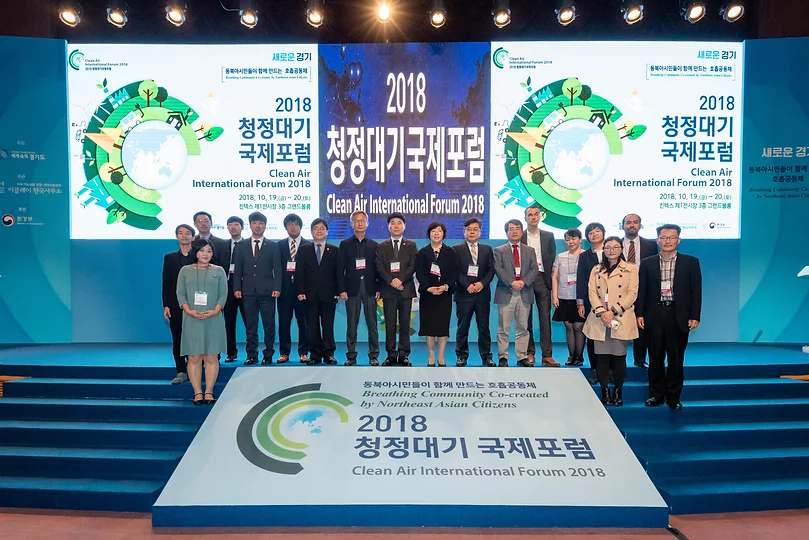2018 Clear Air International Forum gathered stakeholders in South Korea

Jointly organized by the Gyeonggi Provincial Government and the ICLEI Korea Office, the 2018 Clear Air International Forum was successfully hosted in Ilsan, Korea on 19 October along with Eco Fair Korea. On this occasion, ICLEI East Asia was invited to present the government-driven East Asia Clean Air Cities (EACAC) program as a reference for Gyeonggi’s air quality implementation works, during the session “Building Multilevel Governance for Air Quality Improvement”.
With “industrial emission reduction” and “transforming mobility systems” as the main themes, the Forum gathered various stakeholders including that of local governments, private sectors, experts, and local governments in the Northeast Asian region to exchange knowledge and experiences on urban air quality improvement.
Under the topic “Sustainable Urban Policy and Air Quality Improvement”, Dr. Sung-Yong Gong, Chief Research Fellow of the Korea Environment Institute, emphasized that, instead of focusing purely on managing the air quality itself, more attention should be paid to health and well-being as part of policy developments. Moreover, as air flows over boundaries, it is also important to take regional cooperation between different political bodies on air quality improvement into consideration.
With the EACAC program jointly launched by 9 local governments and ICLEI East Asia back in 2016 as an example, Merlin Lao, Program Manager of ICLEI East Asia, introduced city cooperation activities on air quality in the East Asian Region. The EACAC program lowers political barriers, brings local governments together, and provides them with opportunities for capacity building and policy exchange on monitoring and air quality management. Through coordinating international forums, study tours, and joint study projects, EACAC also connects local governments with solution providers including research institutes, academia, and private sectors.

Merlin Lao, Program Manager of ICLEI East Asia, introduced the EACAC program as an example of city cooperation activities on air quality in the region.
On this occasion, a number of East Asian cities also presented their achievements and experiences in tackling air pollution. A representative from Kitakyushu, Japan – one of the EACAC cities – shared the city’s years of experiences in tackling air pollution, and emphasized that in addition to supporting institutions and searching for technological solutions, Kitakyushu has also made efforts on citizen engagement; the Chinese EACAC city Shenzhen, on the other hand, demonstrated its experience of reducing air pollution with a focus on local industries.
With “transforming mobility systems” being one of the main themes of the Forum, special attention was also paid to local actions on transportation and mobility for better air quality. For instance, Professor Hyun-gun Sung from the Chungbuk National University suggested that the transition toward sustainable transportation systems, the goal should move beyond air quality improvement, and further include the shift towards a slow-moving transportation paradigm. In fact, as Dr. Yi Zhifang from the China Urban Sustainable Transportation Research Center presented, various efforts have been made within China in expanding eco-friendly vehicles and traffic demand management, as a way to mainstream “Green Transportation” as a sustainable urban transportation target.
The one-day forum ended with an overview summary of the topics discussed in each session. Participants reached an agreement that, in improving urban air quality, it is critical to developing collaborative air pollution control measures with neighboring cities and countries. Gyeonggi Provincial Government will continue to work with ICLEI on developing its regional collaborative mechanisms.

